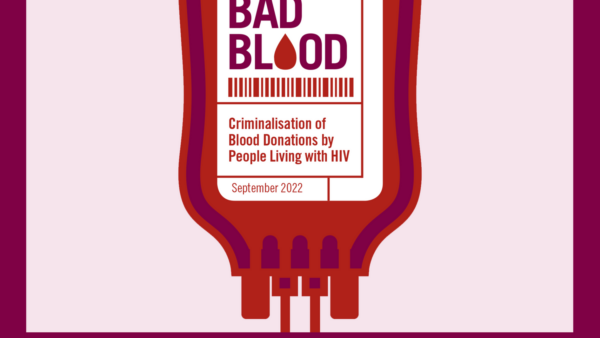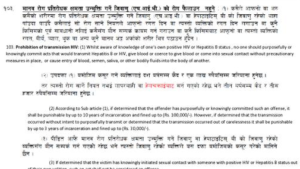Overview
Nepal’s recent Criminal (Code) Act, 2074 (2017) includes a number of sections potentially criminalising people living with HIV, although there have been no known prosecutions to date under this law or any previous laws.
Section 104 makes it illegal to “do any act that spreads or is likely to spread” an infectious disease which is dangerous to life. The offence is separated into three categories: intentional (10 years’ imprisonment and 100,000 NPR fine); careless (5 years’ imprisonment and 50,000 NPR fine), and negligent (3 years’ imprisonment and 30,000 NPR fine).
Section 105 of the Criminal (Code) Act is titled “Prohibition of transmitting human immune-deficiency virus (HIV positive)”, although it relates to both HIV and Hepatitis B. The law makes it an offence for a person living with HIV or Hep B to have sex “without taking any kind of precaution”. The definition of “any kind of precaution” is currently unclear. The law does provide for a defence if the HIV-positive accused’s partner “solicited and established sexual intercourse”.
Section 105 also states a person who knows they have HIV or Hep B must not make a blood donation or transfuse their blood, semen, saliva, sputum or human organ into another’s body, despite the fact that HIV cannot be transmitted by saliva or sputum. The offence is separated into two categories: intentional (10 years’ imprisonment and 100,000 NPR fine), and negligence or recklessness (3 years’ imprisonment and 30,000 NPR fine) (see our report, Bad Blood, for a global analysis of the criminalisation of blood donations).
The law also includes a provision under Section 106 making it a criminal offence for a person to violate a communicable disease ruling, directive order, with a penalty not exceeding six months and/or a 5000 NPR fine. If the person’s actions cause the death of a person, they will be liable to further penalties depending on whether the act was: intentional (10 years’ imprisonment and 100,000 NPR fine); careless (5 years’ imprisonment and 50,000 NPR fine); or negligent (3 years’ imprisonment and 30,000 NPR fine).
Laws
Criminal (Code) Act, 2074 (2017)
Chapter-5 Offences against Public Interest, Health, Safety, Convenience and Morals
Section 104 Prohibition of spreading infectious disease:
(1) No person shall do any act that spreads or is likely to spread any kind of infectious disease which is dangerous to life of any one.
(2) A person who commits, or causes to be committed, the offence referred to in sub-section (1) shall be liable to a sentence of imprisonment for a term not exceeding ten years and a fine not exceeding one hundred thousand rupees, if the offence has been committed intentionally or knowingly, to a sentence of imprisonment for a term not exceeding five years and a fine not exceeding fifty thousand rupees, if the offence has been committed recklessly, and to a sentence of imprisonment for a term not exceeding three years and a fine not exceeding thirty thousand rupees, if the offence has been committed negligently.
Criminal (Code) Act, 2074 (2017)
Section 105 Prohibition of transmitting human immuno-deficiency virus (HIV positive)
(1) No person, knowing that his or her own body or any other’s body contains human immuno-deficiency virus (HIV positive) or the virus of Hepatitis B, shall with intent to transmit such disease to another person, donate his or her blood to such person or cause the donation of such other person’s blood or have sexual intercourse with any one without taking any kind of precaution or transfuse in any way his or her or such person’s blood, semen, saliva, sputum or human organ into other’s body.
(2) A person who commits, or causes to be committed, the offence referred to in sub-section (1) shall be liable to a sentence of imprisonment for a term not exceeding ten years and a fine not exceeding one hundred thousand rupees. Provided that where such disease has got transmitted with negligence or recklessness, failing any intent to transmit it, the offender shall be liable to a sentence of imprisonment for a term not exceeding three years and a fine not exceeding thirty thousand rupees.
(3) Where the victim himself or herself has solicited and established sexual intercourse with a person having the human immuno-deficiency virus or the virus of Hepatitis B, the person having the infection of such virus shall not be considered to have committed the offence referred to in this Section.
Further resources
This report is the result of a national review and multi-stakeholder consultations, relating to the legal and policy barriers towards the elimination of HIV-related stigma, discrimination, and violence. The Review aimed to analyse the laws, policies, law enforcement practices and access to justice
based on data from a desk review and thematic group consultations with people living with HIV and other key populations; and make concrete recommendations for creating an enabling environment for the National HIV response to be successful.
Acknowledgements
Our thanks to Australian law firm Hall & Wilcox for their research assistance to confirm current relevant legislation.
HIV Justice Network's Positive Destinations
Visit the Nepal page on Positive Destinations for information on regulations that restrict entry, stay, and residency based on HIV-positive status, as well as access to HIV treatment for non-nationals.


